Can Soda Pop Cause Kidney Stones? Insights from Plurefy on Risks
- plurefy com
- Aug 4, 2025
- 5 min read
Updated: Sep 3, 2025
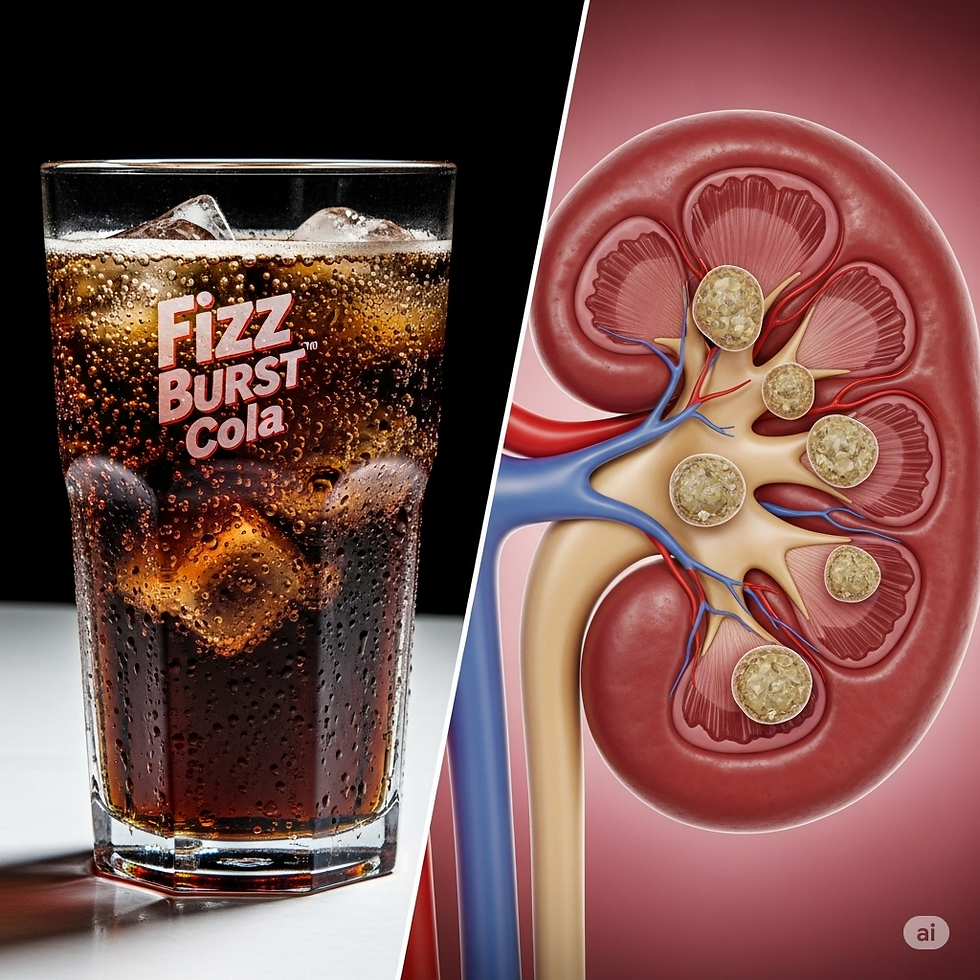
Kidney stones are hard deposits made of minerals and salts that form inside your kidneys. They vary in size, and while some may pass unnoticed, others can cause significant pain and discomfort as they move through the urinary tract.
The Formation Process
Kidney stones form when certain minerals and salts in your urine become highly concentrated, leading to crystallization. These crystals can then bind together to form stones. The process is often slow and may take weeks or months before the stones grow large enough to cause symptoms. Understand how dehydration leads to stone formation.
Types of Kidney Stones
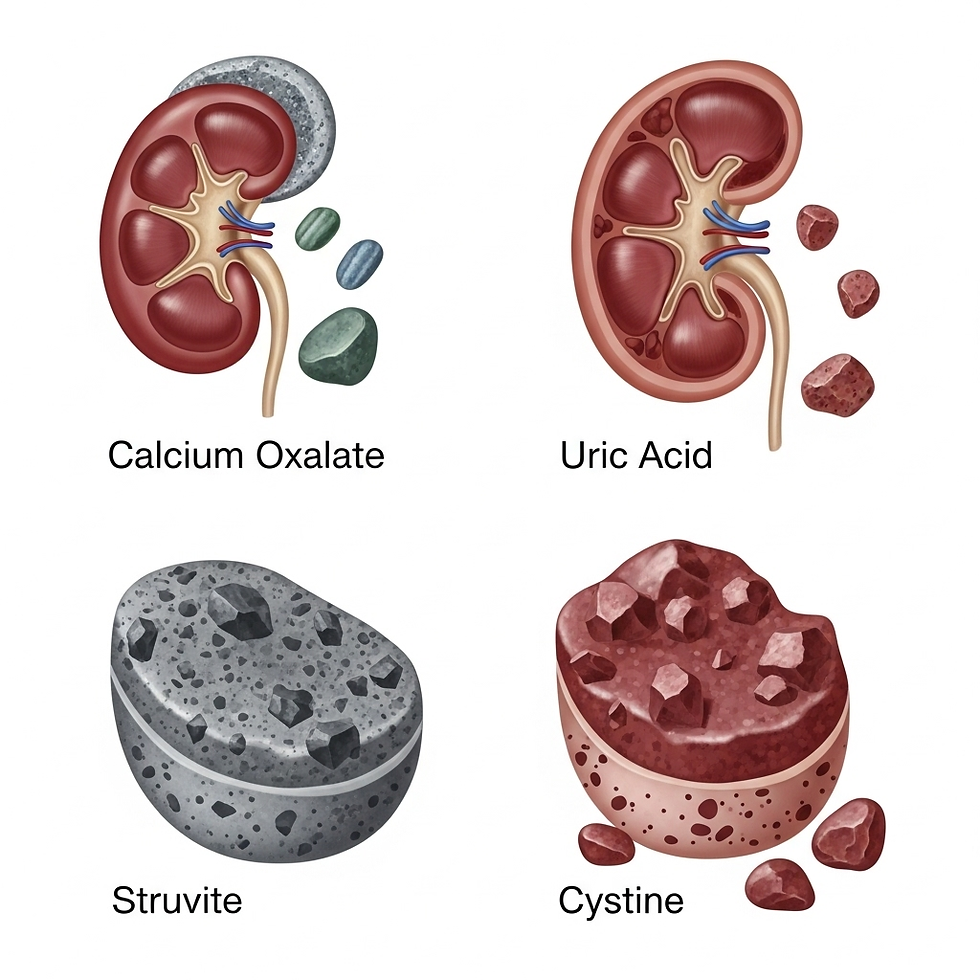
There are several types of kidney stones, each with unique causes and characteristics. The most common types include calcium oxalate stones, uric acid stones, struvite stones, and cystine stones. Understanding the type of stone you have can help tailor prevention strategies. Learn about dietary approaches for each stone type.
Symptoms and Complications
While small stones may pass without causing symptoms, larger stones can block the urinary tract, leading to severe pain, nausea, and urinary tract infections. If left untreated, kidney stones can cause kidney damage or lead to other complications such as chronic kidney disease. Find out how chronic kidney issues manifest.
Common Causes of Kidney Stones
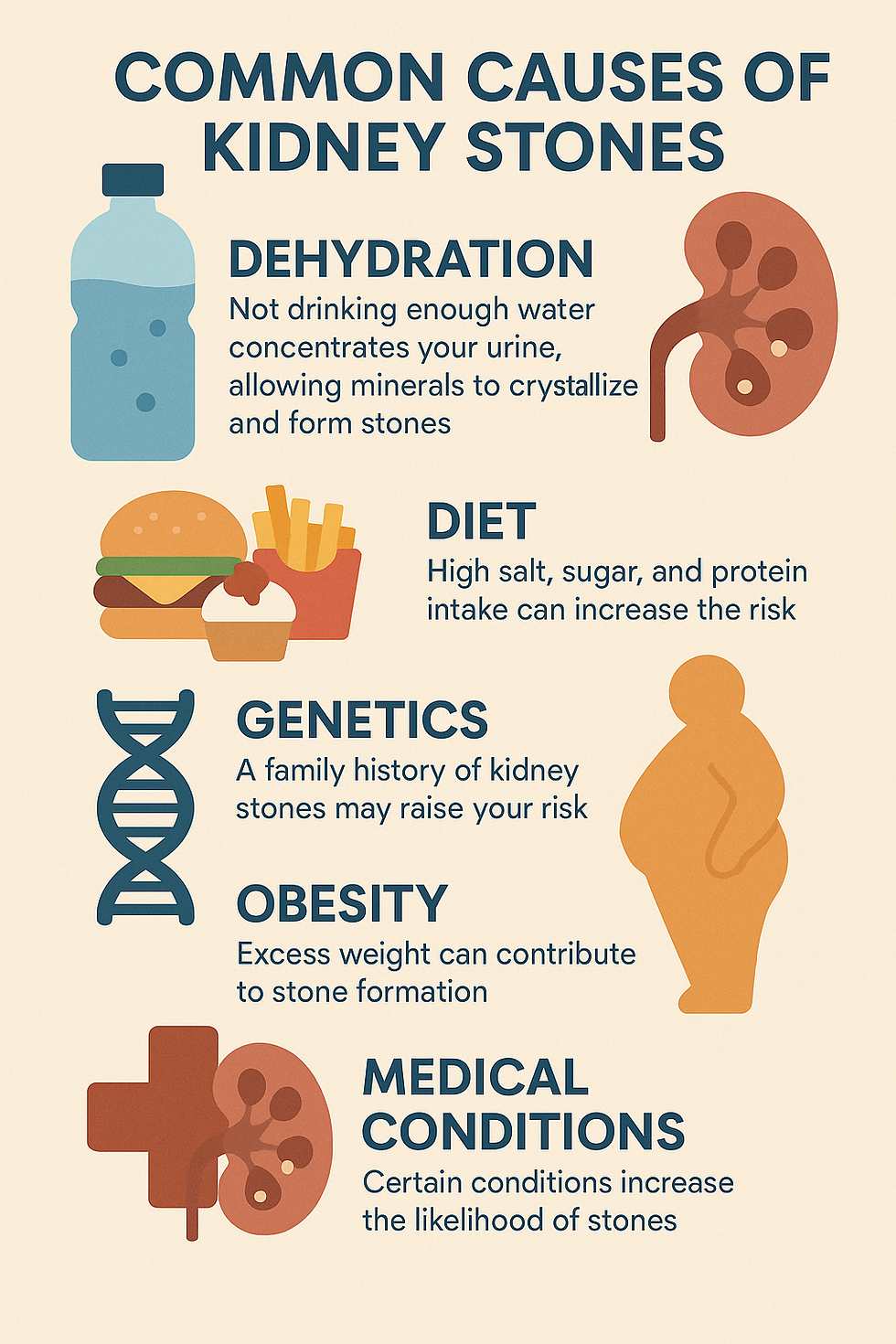
Dehydration
Not drinking enough water concentrates your urine, allowing minerals to crystallize and form stones. Staying hydrated is crucial, especially in hot climates or during physical activity, to dilute your urine and reduce stone formation risk. Read more on hydration strategies for kidney support.
Diet
Diets high in salt, sugar, and protein can increase the risk of kidney stones. Consuming excessive amounts of animal protein can raise uric acid levels, while high salt intake increases calcium in the urine, both contributing to stone development. See our guide on smart eating habits for kidney health.
Genetics
Family history plays a role in determining your likelihood of developing kidney stones. If your parents or siblings have had kidney stones, your risk may be higher due to inherited metabolic traits.
Obesity
Excess body weight can alter the chemical composition of urine, promoting stone formation. Obesity increases the risk of insulin resistance, which can lead to increased calcium and oxalate excretion in the urine. Explore the link between obesity and kidney function.
Medical Conditions
Certain conditions, such as gout and inflammatory bowel disease, can increase the risk of developing kidney stones. These conditions may alter the balance of substances in the urine, making stone formation more likely.
The Connection Between Soda Pop and Kidney Stones
Sugar and Kidney Stones
Soda pop is high in added sugars, which can lead to obesity and diabetes—both risk factors for kidney stones. The high fructose corn syrup commonly found in soda can increase the amount of calcium, oxalate, and uric acid in the urine, all of which contribute to stone formation. Learn more about sugar's impact on kidney health.
Impact of Fructose
Fructose is metabolized in the liver, where it can increase uric acid production. Elevated uric acid levels can lead to the formation of uric acid stones and increase the risk of developing calcium oxalate stones.
Obesity Link
Excessive sugar intake from sodas can contribute to weight gain and obesity, further increasing the risk of kidney stones. The more weight you carry, the more likely you are to develop metabolic changes that promote stone formation.
Diabetes Risk
High sugar consumption can also lead to insulin resistance and diabetes, conditions that are associated with an increased risk of kidney stones. Managing blood sugar levels is crucial for stone prevention. Check out tips for managing blood sugar naturally.
Caffeine and Kidney Stones
Many sodas contain caffeine, a diuretic that increases urine production. While this might seem beneficial, excessive caffeine consumption can lead to dehydration, concentrating minerals in the urine and increasing the risk of kidney stones.
Diuretic Effect
Caffeine's diuretic effect can cause increased urine output, potentially leading to dehydration if fluid intake is not sufficient. Dehydration is a known risk factor for kidney stone formation.
Mineral Concentration
When urine becomes concentrated due to dehydration, minerals and salts can crystallize more easily, leading to stone formation. Moderating caffeine intake and ensuring adequate hydration can help mitigate this risk.
Alternatives to Caffeine
Choosing caffeine-free beverages or limiting caffeine consumption can be beneficial for those prone to kidney stones. Herbal teas and water are excellent alternatives that do not carry the same risks. Discover kidney-safe beverages.
Phosphoric Acid in Soda
Dark-colored sodas often contain phosphoric acid, which can lower citrate levels in the urine. Citrate is a natural inhibitor of kidney stone formation, so reduced levels can increase the likelihood of stones developing.
Role of Citrate
Citrate binds with calcium in the urine, preventing it from forming stones. Phosphoric acid can interfere with this protective mechanism, making stone formation more probable.
Dark Sodas Risk
Dark sodas tend to have higher phosphoric acid content, posing a greater risk to those susceptible to kidney stones. Opting for clear or citrus-based beverages may help reduce this risk.
Dietary Adjustments
Increasing the intake of citrate-rich foods, such as lemons and oranges, can help counteract the effects of phosphoric acid. These fruits can boost citrate levels in the urine, providing a natural defense against stones. See top foods for kidney support.
Scientific Studies on Soda Pop and Kidney Stones
Several studies have investigated the relationship between soda consumption and kidney stones. While some findings suggest a strong connection, others are less conclusive. However, the general consensus is that excessive soda pop consumption is not beneficial for kidney stone prevention.
Key Research Findings
Increased Risk: Research indicates that consuming large amounts of soda pop, especially those high in fructose and phosphoric acid, is linked to an increased risk of kidney stones.
Citrate Levels: Studies have shown that drinking soda pop can reduce urinary citrate levels, diminishing its protective effects against stone formation.
Soda Substitution: Replacing soda with water or citrus-based beverages can lower kidney stone risk. Learn how lemon water helps.
Many wonder if sugary drinks like soda can lead to kidney stones, and the answer is complex. For a full overview, it's helpful for understanding kidney stones' causes and prevention. It's also key to know what causes kidney stones in men, as risk factors can differ. Since symptoms can be varied and sometimes confusing, people often ask, "do kidney stones cause constipation?"
Beyond diet, other elements of modern life can influence kidney health. For example, some research explores if work stress can cause kidney stones. Additionally, it's wise to consider the side effects of medications, prompting questions like, "does Ozempic cause kidney stones?" A comprehensive view of diet, stress, and medication is essential for managing your risk.
Kidney Stone Prevention Tips
Stay Hydrated
Drink plenty of water throughout the day to dilute your urine and reduce the risk of stone formation. Aim for at least 8-10 glasses daily.
Modify Your Diet
Reduce Salt and Sugar: Limit salty and sugary foods, including soda pop.
Eat Calcium-Rich Foods: These help prevent calcium oxalate stones.
Limit Oxalate-Rich Foods: Such as spinach and nuts.
Maintain a Healthy Weight
Exercise regularly and follow a balanced diet. Find beginner fitness tips.
Monitor Medication and Supplements
Review medications with a doctor and avoid overuse of calcium or vitamin C supplements.
Limit Soda and Caffeine
Reduce soda and caffeine consumption. Choose kidney-friendly beverages.
Conclusion
While soda pop is not the sole cause of kidney stones, its high sugar, caffeine, and phosphoric acid content can contribute to their formation. By understanding this connection, you can make informed choices to reduce your risk. Prioritize hydration, maintain a healthy diet, and reduce soda consumption to prevent stones and improve overall wellness.

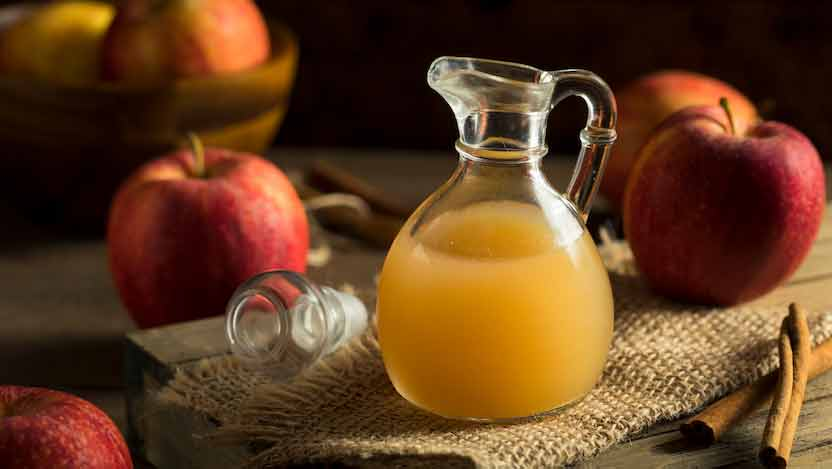
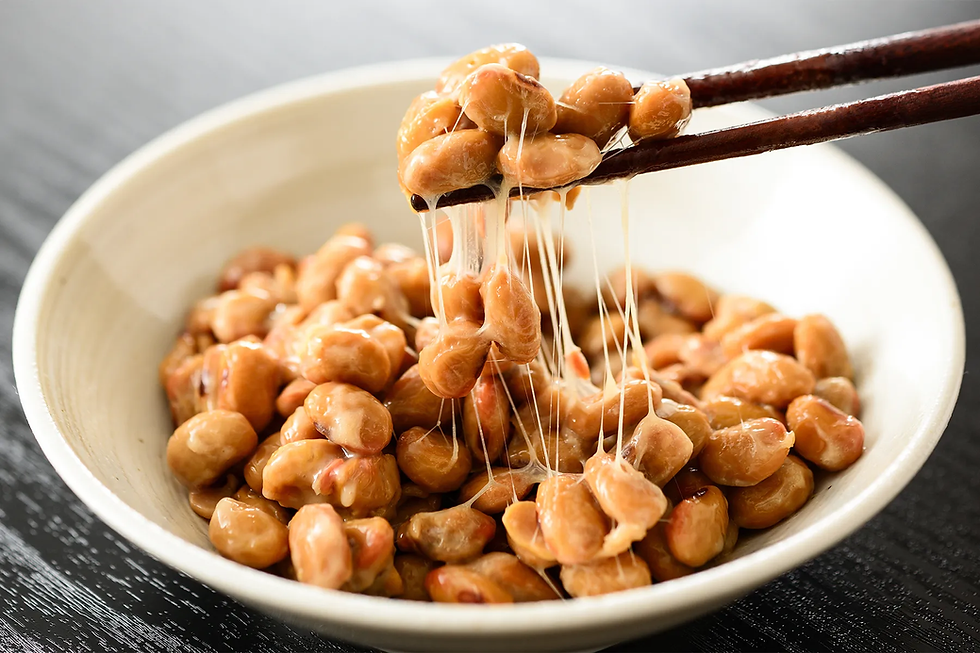







Comments